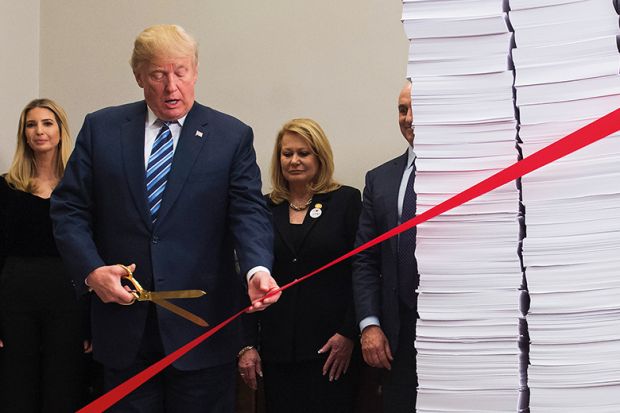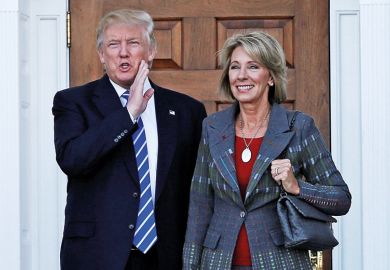US universities left disappointed in one of their main hopes from the Donald Trump administration – relief from billions of dollars in regulatory burdens – are waiting to see if Joe Biden will attempt to tackle the seemingly intractable problem.
Republicans have long crusaded on the notion that they would reliably fight excessive rules imposed by the government, and Mr Trump was especially boastful.
“As president,” Mr Trump declared in one 2016 campaign speech, “I will immediately take steps to drive down college costs by reducing the unnecessary cost of compliance with federal regulations so that colleges can pass on the savings to students.”
Mr Trump left office last month without fulfilling the commitment. His science adviser, Kelvin Droegemeier, did identify regulatory relief as a priority. But having been appointed only halfway through Mr Trump’s term in office, Dr Droegemeier ran out of time to complete the job.
The size of the problem has been chronically difficult to define and calculate, but it is widely understood to fall especially heavy on academic science, accounting for a substantial percentage of the $42 billion (£30 billion) a year that universities spend from federal research grants.
Part of the problem in estimating is that federal reporting requirements often fall on individual scientists, many of whom have guessed for years that they spend half their working hours on administrative chores.
Many of the requirements are necessary elements of guarding against fraud and abuse, protecting both taxpayers and research subjects, the US Government Accountability Office said in a recent analysis.
Yet, the GAO said, much could be done to reduce informational demands that were not necessary or were outdated, and to share data collection efforts across the various federal agencies.
In particular, the federal auditing office said, the Trump administration failed to fulfil a 2016 law authorising the creation of an advisory body, to be known as the Research Policy Board, that would carry out that harmonisation effort.
White House officials offered a procedural explanation for that failure, which university leaders “never agreed with or understood the logic behind”, said Tobin Smith, vice-president for policy at the Association of American Universities.
That inaction, said Barry Bozeman, a professor of technology policy and public management at Arizona State University, likely reflected both the difficulty of the challenge and Mr Trump’s lack of genuine concern for it.
“In general,” said Professor Bozeman, an expert in both higher education and government regulations, “higher education policy was not much on the Trump radar screen, in part because he had no apparent interest in improving higher education performance, productivity or reach.”
In the limited areas where the Trump administration did attack regulations affecting higher education, he continued, education secretary Betsy DeVos cut the number of staff investigating for-profit colleges and weakened policies supporting college students with disabilities.
“So there was some deregulation – making life easier for for-profit colleges and universities and making sure that those with disabilities are less protected,” Professor Bozeman said.
Mr Biden might devote some effort to the problem, Professor Bozeman said, given his clear political and personal concern with higher education. Yet, he acknowledged, “higher education policy is not near the top of the list for most presidents”.
A Biden White House official suggested support for pursuing the Research Policy Board, noting in response to questions that the idea for the regulation-shrinking effort was initiated in the Obama administration, but offering no specific commitment on the matter.
Register to continue
Why register?
- Registration is free and only takes a moment
- Once registered, you can read 3 articles a month
- Sign up for our newsletter
Subscribe
Or subscribe for unlimited access to:
- Unlimited access to news, views, insights & reviews
- Digital editions
- Digital access to THE’s university and college rankings analysis
Already registered or a current subscriber?










